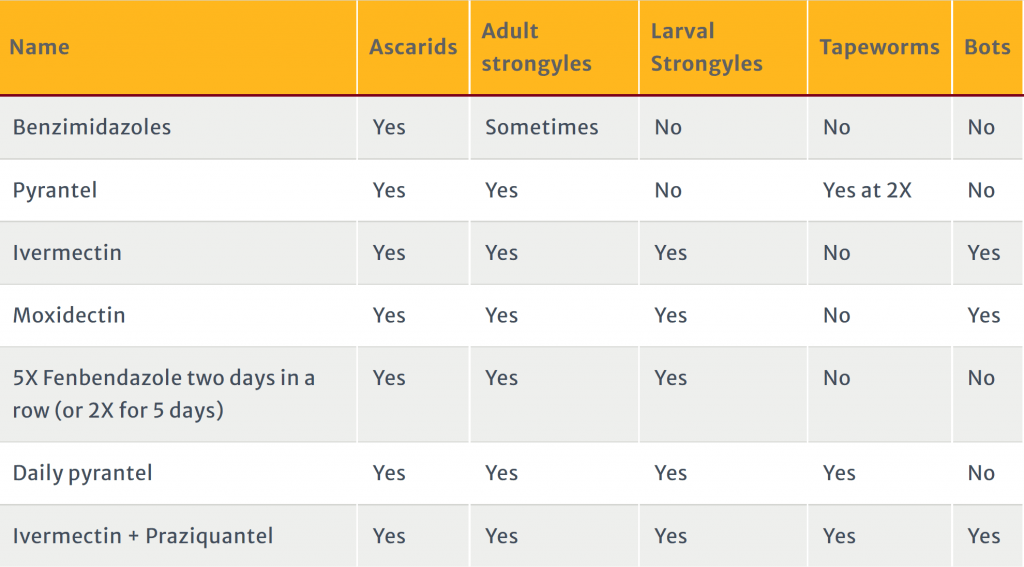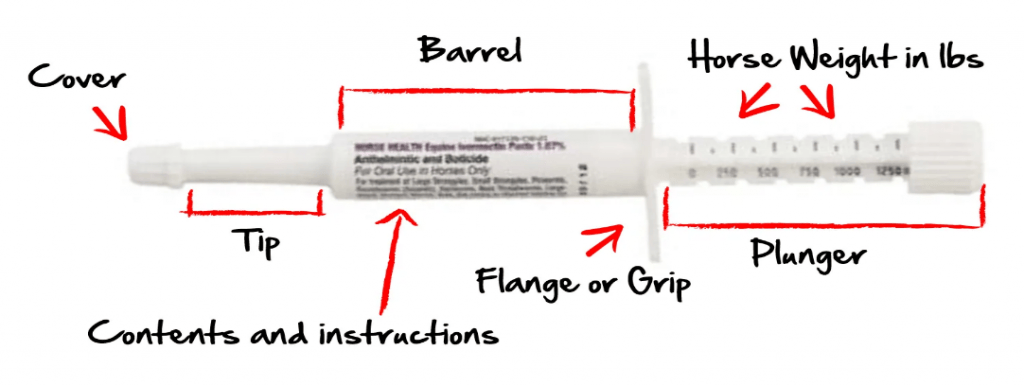Horses consume most parasites while grazing. After entering your horse, some parasites burrow through your horse’s respiratory, circulatory and intestinal systems until they take up permanent residence in your horse’s large intestine. When left untreated, parasites cause inflammation, ulcers and damage to your horse’s intestinal lining and can contribute to colic, anaemia, and nutritional deficiencies.
A good internal parasite protocol involves the following steps:
- Continuous pasture/environment management
- Scheduled faecal egg count (FEC) tests
- Deworming according to FEC results
There are four key anthelmintic groups used for intestinal parasite control in horses, with different chemical ingredients controlling different types of worms. The key to selecting a dewormer is to know which worms needs to be targeted and thus which active ingredient needs to be used in a program.
The four main anthelmitic groups
1. Macrocyclic lactones (MLs or “mectins”) include:
- Avermectins (abamectin, ivermectin)
- Milbemycin (moxidectin)
Macrocyclic lactones or mectins are the most widely used class of anthelmintics. They are very effective against a wide range of parasites, but they do not work against tapeworms. Compared to other chemicals the MLs, including ivermectin, are able to control younger stages of many worms and also persist in the body to give a longer control period.
2. Benzimidazoles (BZs) include drenches ending in “azole”:
- Oxfendazole
- Oxibendazole
- Fenbendazole
BZs treat the majority of worm species, but have no efficacy against tapeworms or bots. Small stronglyes have become widely resistant to BZs when used on their own. However, when used in combination with other chemicals the BZ class can help treat worms that are developing resistance to mectins.
3. Tetrahydropyrimidines (THPs) include:
- Pyrantel
- Morantel
Tetrahydropyrimidines treat most worm species, including some tapeworms, but have no effect on bots. Many worming programs in horses less than two years of age include a THP because mectins and BZs used on their own are not reliable enough against ascarids.
4. Isoquinoline-Pyrazines includes:
- Praziquantel
Praziquantel is highly effective against tapeworms.
Deworming combinations
No single anthelmintic compound is effective against all parasites, especially with increasing resistance developing. Parasitologists recommend that the use of combinations of unrelated chemical groups is an effective strategy to maximize the effectiveness of each treatment given, and to delay chemical resistance.

Deworming products and parasites they control (Source: https://extension.umn.edu/horse-health/controlling-and-treating-parasites-your-horse#selecting-a-dewormer-67461)
Looking at Ivermectin
Ivermectin has been the most important horse anthelmintic since its development in the early 1980’s. It works by blocking the parasite’s nerve transmission, causing paralysis and death.
Interestingly, horse ivermectin treatments against intestinal worms only contain a 1.87% concentration of ivermectin with the remaining 98.13% of the medication being made up by a filler. Ivermectin is mostly used in a paste formulation but can also be purchased as a liquid, which may be more cost-effective for large numbers of horses. Injection of ivermectin is not recommended in horses.
It only takes a small amount (6.08 grams at a 1.87% concentration) of ivermectin to control parasites in a 560 kg horse – that’s only 1/10th the dosage of most of the other equine dewormers. Ivermectin is relatively safe in horses, and has been shown to be safe in foals, breeding stallions and pregnant and lactating mares.
Which parasites does ivermectin control?
Ivermectin is effective against most species of internal parasites and some external parasites. It is especially effective against bots. Ivermectin can kill and control 43 species of parasites, worms and bots in a single dose, including:
- Red Worms (small strongyles)
- Hairworms
- Blood worms (large strongyles)
- Bots
- Roundworms (Ascarids)
- Intestinal threadworms
- Pinworms (Oxyuris)
- Lungworms
- Stomach worms (Habronema)
It is also effective at controlling external parasites such as lice, mites, ticks and the skin-dwelling larvae of Onchocerca.
For ivermectin to be effective, a parasite must be exposed to the drug. Therefore, ivermectin is not effective against parasite larvae that have burrowed into a horse’s tissue (encysted parasites). Additionally, ivermectin is not effective against tapeworms.
How do I know if the ivermectin is working?
Measuring a dewormer’s effectiveness is accomplished by testing your horse’s worm burden before and after administering the ivermectin. This is done by performing faecal egg count (FEC) tests. A faecal egg count identifies how many worm eggs a horse is shedding at the time of the test. Doing the first FEC test before deworming your horse allows you to establish a baseline to compare with the test done after the deworming. This process is called conducting a faecal egg count reduction test to determine the efficacy of your deworming program.
Using ivermectin products
Ivermectin is distributed under a variety of generic and brand names, with the same formulation – 1.87% concentration of ivermectin. Price, convenience and/or brand loyalty drive the purchasing decision. Equine ivermectin dewormers typically comes in a long thin box which contains a syringe sometimes called an applicator. The syringe is preloaded with enough ivermectin (1.87% concentration) to treat a horse up to a specific weight with a single dose. Ivermectin also comes in flavors (e.g., apple).
You can obtain your horse’s weight by using a commercial livestock floor scale. If a scale is not available, you can use a weight tape designed for horses. A horse weight tape is a flexible tape with pounds or kilograms instead of inches or centimetres printed on it. Use a tape long enough to wrap around the circumference of your horse’s girth. Once you obtain your horse’s weight, you need to adjust the ivermectin syringe to deliver the correct dose of medication. The syringe’s plunger is divided into equal weight increments.

(Source: https://zeroeggcount.com/blogs/news/whatisivermectin)
Ivermectin and the problem of resistance
Resistance is the ability of worms to survive a treatment that once was effective against the same parasites. Resistance grows when parasites survive the treatment and then pass the ability to survive on to their offspring. Resistance has become a problem for horse owners due to years of over-treating horses with chemical dewormers.
Ivermectin is no exception when it comes to parasitic resistance. Acarids and pinworms are showing resistance to Ivermectin along with some emerging resistance in small strongyles. The problem is compounded by the lack of new development of equine deworming products. Pharmaceutical companies have not introduced any new anthelmintics for use in horses since 1981, and currently, there is nothing on the horizon. Therefore, the correct use of ivermectin and the continued monitoring of efficacy with FEC reduction tests is important for slowing down the development of resistance in equine gastrointestinal parasites.

